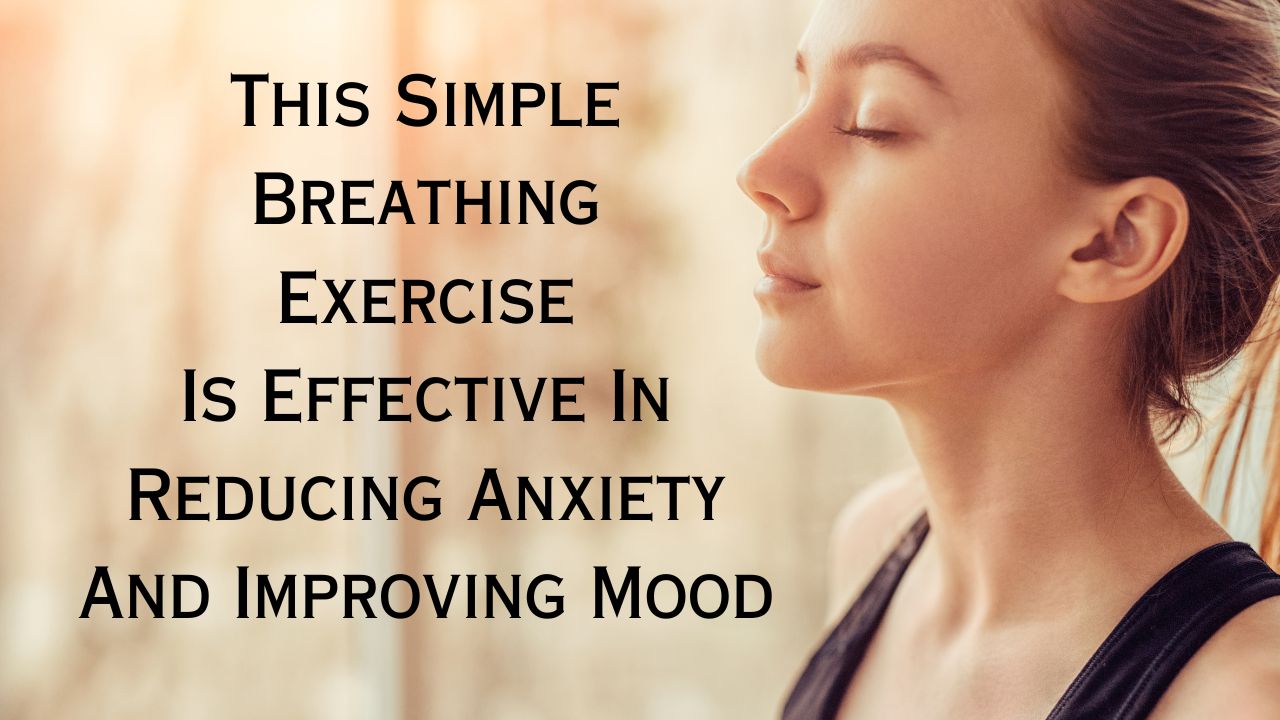A new study has found that a five-minute daily breathing exercise called controlled breathing can help people feel better and feel less anxious.
Breathing Exercise
The Stanford University School of Medicine investigated the possibility of reducing anxiety and enhancing well-being with just five minutes of deliberate breathing per day. Each of the three groups of study participants performed a different daily breathing exercise. The duration and intensity of the inhales and exhales during the exercises varied. A fourth group engaged in the mindfulness practice of paying attention to their own natural breathing.
Over the course of the study’s 28 days, all three breathing patterns were found to reduce anxiety and improve well-being. In addition, all three exercises were more effective than mindfulness at reducing anxiety. The number of days the participants did the exercises increased the positive benefit. The exercise that researchers referred to as “cyclic sighing” with its prolonged exhales produced the greatest improvement. It is done by inhaling through the nose, exhaling slowly and completely through the mouth, and then inhaling even deeper to completely fill the lungs.

Controlled Breathing
David Spiegel, M.D., professor of psychiatry at Stanford University School of Medicine and one of the authors of the study that was published in Cell Reports Medicine, explained that a daily 5-minute cyclic sighing has promise as an effective exercise for stress management.”
Controlled breathing is not known to exactly reduce anxiety. The simple fact that the participants felt good about doing something themselves to alleviate their anxiety is one of the possible explanations offered by the researchers. According to Spiegel’s research, voluntary breathing exercises can…enhance the general sense of control over one’s internal state, which contributes to the increase in positive affect observed.
Anxiety can also be reduced through non-drug methods like limiting time spent on social media and increasing physical activity. Research has observed that exercise is protective against creating tension and successful in fundamentally lessening the side effects of nervousness. Another study found that limiting social media use to 30 minutes per day for three weeks significantly reduced symptoms of anxiety and improved well-being.
Anti-Anxiety Medications
In stark contrast to the sedatives (benzodiazepines) and other anti-anxiety medications that are frequently prescribed for anxiety, these natural methods of anxiety reduction are. At least 79 studies have demonstrated that anti-anxiety medications can have undesirable side effects, such as an increased risk of death, fractures, heart problems, cognitive impairment, amnesia, dementia, impaired driving, sleepwalking, insomnia, depression, hallucinations, aggression, homicidal ideation, suicide, and even anxiety. For a rundown of these examinations, look for “antianxiety” at www.cchrint.org/psychdrugdangers/and look down to see the medication studies.)
WARNING: Due to the potential for dangerous withdrawal symptoms, it is advised that anyone who wishes to stop taking an antianxiety or other psychiatric medication or alter the dose only do so under the supervision of a physician.

Citizens Commission on Human Rights
Tension and other undesirable close to home and social side effects can have actual causes. The symptoms may be mistaken for a psychiatric disorder if they are not properly diagnosed. The Citizens Commission on Human Rights (CCHR) recommends a comprehensive physical examination with lab tests, nutritional and allergy screenings, and a review of all current medications in order to identify any physical causes.
The CCHR continues to educate the general public about the dangers of serious side effects and withdrawal symptoms from antianxiety and other psychiatric medications so that patients and their doctors can make well-informed decisions about whether to take the medications or stop taking them. Science-based, non-drug approaches to mental health are supported by CCHR.
Members of the Church of Scientology and the late psychiatrist and humanitarian Thomas Szasz, M.D., recognized by many academics as the most authoritative critic of modern psychiatry, co-founded the Citizens Commission on Human Rights in 1969 to end abuses and restore human rights and dignity to the mental health field. 228 laws worldwide against psychiatric abuse and human rights violations were made possible thanks to the CCHR.
The CCHR National Affairs Office in Washington, DC, has advocated for state and federal mental health rights and protections. Over 800,000 people have been educated on the history and current state of racist and abusive psychiatric practices by the CCHR traveling exhibit, which has been displayed at the Congressional Black Caucus Foundation Annual Legislative Conference in Washington, DC, as well as other locations.
Find more now:
Related
Related posts
Categories
- Accident Lawyers (19)
- Adventure (1)
- Art (7)
- Author (24)
- Books (34)
- Business (32)
- Celebrity News (8)
- Debt (6)
- Design (3)
- Economy (11)
- Educational info (74)
- Events (11)
- Fashion (7)
- Filmmakers (8)
- Food (29)
- Gaming (10)
- Guide (7)
- Health & Beauty (43)
- Home (41)
- Insurance (8)
- Interior (1)
- Life (1)
- Lifestyle (5)
- Loans (11)
- Mortgage Loans (5)
- Motivation (4)
- Music (10)
- Parenting (1)
- People (3)
- Pets (5)
- Photography (4)
- Podcasts (5)
- Politics (2)
- Products (23)
- Relationships (3)
- Review (1)
- Scholarship (15)
- Student Loan (3)
- Style (1)
- Tax Lawyer (3)
- Tech (58)
- Travel (30)
- TV And Film (2)
- Uncategorised (8)
- Uncategorized (9)
Subscribe Now
* You will receive the latest news and updates on your favorite celebrities!





Social Media